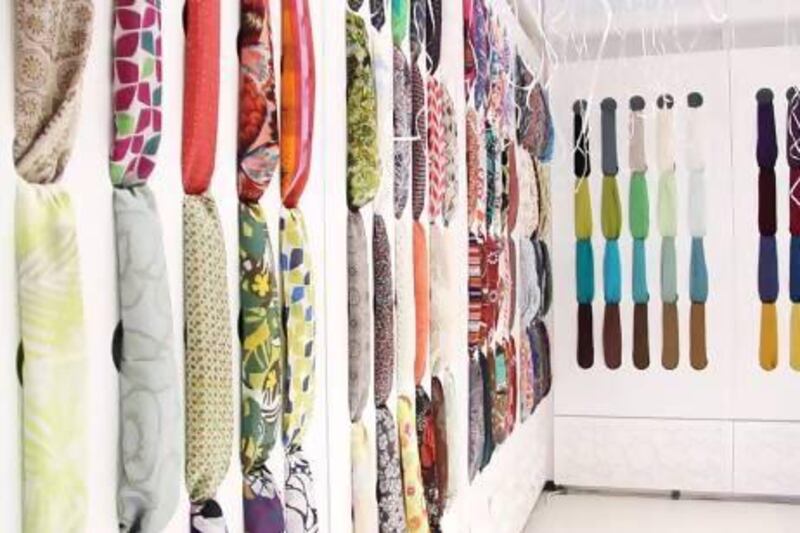There's a shop in Jeddah's Red Sea Mall that style-conscious women in Saudi Arabia have been raving about since it opened three years ago. It's called Tarhati ("my scarf" in Arabic), and its walls are lined with every type of fabric you can imagine: gold embroidery, 1970s-style bold prints and gauzy fabric in every colour of the rainbow. Its Facebook page, which has more than 11,000 fans, is cluttered with messages of support and the store moved to a larger location in June.
Earlier this year, it was announced that the company's founder, Rayyan Jamjoom, had been awarded a Young Creative Entrepreneur prize by the British Council and Jamjoom was flown over to London for Fashion Week to talk business with Paul Smith, meet potential investors and learn about building an online presence. He now has plans to sell his wide range of colourful scarves to Muslims in countries including Britain, France and the Netherlands.
The vast majority of both abayas and headscarves in Saudi Arabia are black, but part of Jamjoom's mission is to challenge that orthodoxy. "I wanted to shift the mindset of the entire society," he says. "You know what, you don't have to wear a black scarf. You can be a veiled lady and also be unique and express yourself." It's common practice, he says, for a man in Saudi Arabia to buy one suit and a dozen different ties to wear with it, and he wants women to think about scarves in the same way.
According to Jamjoom, the culture is slowly changing and it's young, educated women who are the early adopters. While outside Jeddah, he says, only one woman in a hundred will be wearing a colourful scarf, in an upmarket mall in the north of the city the number is more likely to be 10 or 12. But there is still resistance among traditionalists: Tarhati is a company people either love or hate.
"I receive a lot of messages on Facebook saying: 'This is not right. Don't try to ruin the values of our young generation,'" Jamjoom says, but these messages don't make him question what he does. On the contrary: "Sometimes they fuel my energy, actually, because I believe that there is nothing wrong with wearing a veil and at the same time being trendy and modern and empowered."
The idea for the store first came about almost a decade ago, when Jamjoom noticed his mother and sisters stocking up on coloured scarves on family trips to Egypt and realised there was no proper supplier in Saudi Arabia. While still at high school, he got a loan from his father and started buying Egyptian scarves in bulk and selling them to family and friends. He went on to study marketing at King Fahd University and then got a job at Unilever, but he continued developing his business idea at the same time and launched the first Tarhati store in 2009. He now reports "healthy, double-digit" growth.
Tarhati is still the only shop in Saudi Arabia specialising in headscarves, although it has recently diversified to include other items of clothing, such as shirts and tunics. While shoppers looking to buy a casual scarf can choose from around 4,000 different types of fabric, women who want something entirely unique can choose from the exclusive line, from which only one example of each style will ever be made. If a person bought a scarf, Jamjoom explains, and then her best friend wanted the same one, he'll tell her: "I'm sorry, it's already been sold." Sixty per cent of Tarhati's profits, he says, come from the exclusive line.
Jamjoom's energies are currently focused on getting the shop on the internet, but he is keen to eventually expand elsewhere in the Gulf and says that the UAE is "a very appealing market" for the company - especially Abu Dhabi, where start-up costs will be less than in Dubai and where there is a greater proportion of Emirati nationals.
A Tarhati advert published in the magazine Jeddah Links shows a smiling Saudi woman on the phone in what looks like an office, wearing a purple headscarf embroidered with lilac arabesques over her abaya. The marketing strategy is about changing behaviour as much as it's about increasing awareness of the actual brand. "We believe if you're strong enough, you would do whatever you want if you believe that this is right," Jamjoom says. "For a lot of our customers, this made sense."
Follow
Arts & Life on Twitter
to keep up with all the latest news and events
[ @LifeNationalUAE ]





